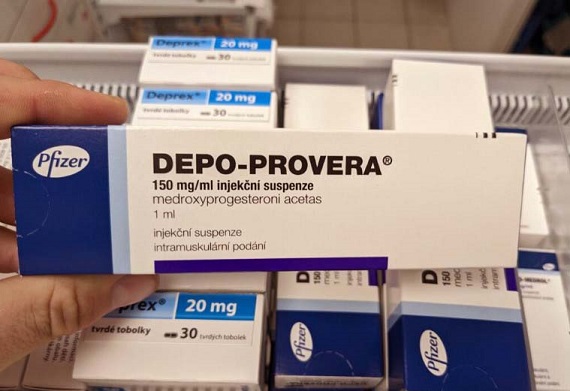Women Sue as Popular Birth Control Drug Made by American Pharma Giant Pfizer Found to Cause Brain Tumors!
Nikhil Prasad Fact checked by:Thailand Medical News Team Oct 19, 2025 3 months, 3 weeks, 5 days, 3 hours, 25 minutes ago
Medical News: Mounting Legal Storm Over Pfizer’s Contraceptive
More than 1,000 women across the United States are suing American pharmaceutical giant Pfizer after developing brain tumors allegedly caused by its long-standing birth control injection, Depo-Provera. The lawsuits claim that Pfizer knowingly failed to warn users about potential neurological risks linked to the drug, which has been widely prescribed since the 1990s. At the heart of the litigation is mounting scientific evidence suggesting a disturbing connection between Depo-Provera—a synthetic hormone-based contraceptive—and meningiomas, slow-growing tumors that develop on the membranes surrounding the brain and spinal cord. Amid this growing controversy, this
Medical News report examines the latest research findings and explains why the discovery has reignited public concern over the long-term safety of hormonal birth control.
 Women Sue as Popular Birth Control Drug Made by American Pharma Giant Pfizer Found to Cause Brain Tumors
The Study That Sparked Nationwide Alarm
Women Sue as Popular Birth Control Drug Made by American Pharma Giant Pfizer Found to Cause Brain Tumors
The Study That Sparked Nationwide Alarm
A groundbreaking study conducted by scientists from the Cleveland Clinic and Case Western Reserve University analyzed medical data from over 61 million female patients. Their findings, published in JAMA Neurology, revealed that women who used Depo-Provera, medically known as depot medroxyprogesterone acetate (DMPA), had nearly double the risk of being diagnosed with meningioma compared to those who did not use hormonal contraceptives. The risk was found to be particularly high among women who began using the drug after the age of 31 or who continued use for four years or longer. Although meningiomas are generally non-cancerous, they can cause serious complications by exerting pressure on the brain and optic nerves, sometimes leading to vision loss, seizures, or motor impairment. Researchers noted that the female hormone progestin, which mimics the effects of natural progesterone, appears to fuel tumor growth in certain tissues.
Depo-Provera’s Troubled History
The journey of Depo-Provera has long been fraught with controversy. Developed in the 1950s, medroxyprogesterone acetate was initially tested to treat uterine disorders before being repurposed as a contraceptive. The U.S. Food and Drug Administration (FDA) withheld approval for nearly four decades, citing cancer-related safety concerns, until finally authorizing its use in 1992. Even then, the drug carried a reputation for side effects. In 2004, the FDA required a “black box” warning, cautioning users about bone mineral density loss linked to long-term injections. Despite these warnings, Depo-Provera has remained a preferred contraceptive option for millions of women worldwide, especially those seeking an alternative to daily oral pills.
The French Connection and Mounting Scientific Evidence
The U.S. findings echoed the results of an earlier French study published in The BMJ in 2024, which found that women who used Depo-Provera for over a year had a 5.6-fold increase in the risk of
developing meningioma. European regulators have since mandated stronger warnings on high-dose progestin drugs, including medroxyprogesterone acetate. France and Canada have already updated product labels to reflect potential brain tumor risks, while U.S. regulators have so far stopped short of making similar changes.
Inside the Lawsuits Against Pfizer
The lawsuits, consolidated into a multidistrict litigation (MDL) in Florida, accuse Pfizer of negligence, product liability, and failure to warn. Plaintiffs argue that the company had access to decades of hormonal research linking progesterone-based compounds to brain tumor formation but did not adequately investigate or disclose the risks. One plaintiff, Robin Phillip of Louisiana, claims that her use of Depo-Provera led to the development of a meningioma that caused partial blindness and mobility problems. Her attorney, Ellen Relkin, told NBC News that “these women all have meningiomas. Many have undergone surgery or radiation, and their lives have been forever changed.”
Pfizer, however, has denied all allegations, maintaining that its actions were consistent with FDA guidelines. The company emphasized that Depo-Provera “has been used safely by millions of women worldwide” and remains “an important option for reproductive health management.” Pfizer’s legal team also revealed that it had requested FDA permission in 2023 to include a tumor warning on the drug’s label, but the agency declined, stating that available evidence did not justify such a modification.
Ongoing Scientific Debate and Health Implications
While researchers have established a statistical correlation between DMPA and meningioma, they caution that the study was observational and cannot definitively prove causation. Nevertheless, the evidence suggests that prolonged exposure to synthetic progestins may influence abnormal cell growth in certain brain tissues. Health experts now urge women who use Depo-Provera for extended periods to consult their doctors about potential risks, especially if they experience persistent headaches, blurred vision, or neurological symptoms.
Conclusion
The growing body of research and rising tide of litigation against Pfizer mark a pivotal moment in the conversation about women’s reproductive health and pharmaceutical accountability. Though the absolute risk remains small, the potential connection between Depo-Provera and brain tumor development raises urgent questions about long-term hormone exposure and corporate transparency. As more scientific evidence emerges, health authorities worldwide may soon be forced to revisit current safety standards for hormonal contraceptives and strengthen patient warnings. For many affected women, justice and awareness are now as crucial as treatment itself.
References:
https://jamanetwork.com/journals/jamaneurology/article-abstract/2838202
https://jamanetwork.com/journals/jama/article-abstract/2818002
https://www.bmj.com/content/384/bmj-2023-078078
https://www.reuters.com/legal/litigation/pfizer-says-it-couldnt-have-warned-about-tumor-risk-depo-provera-lawsuits-2025-08-25/
For the latest on American Pharma Giant Pfizer and the number of lawsuits they are facing, keep on logging to Thailand
Medical News.
Read Also:
https://www.thailandmedical.news/news/breaking!-shocking-discovery-links-birth-control-injections-by-pfizer-to-brain-tumors
https://www.thailandmedical.news/news/medical-news-alarms-raised-on-tik-tok-about-pfizer-s-controversial-contraceptive-that-western-doctors-are-prescribing-for-longer-than-two-years
https://www.thailandmedical.news/articles/pharma-news
https://www.thailandmedical.news/articles/med-news
